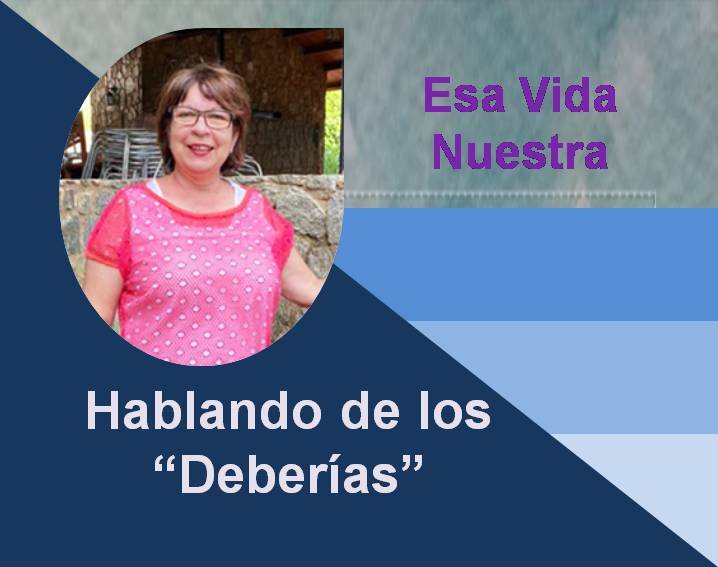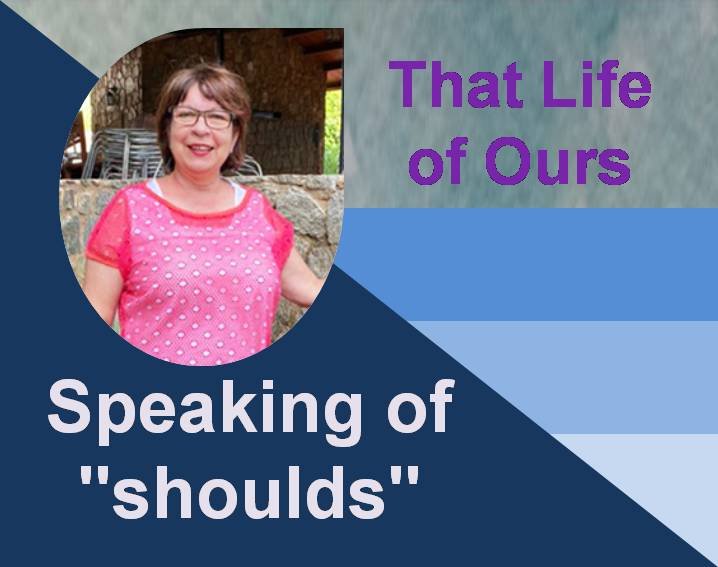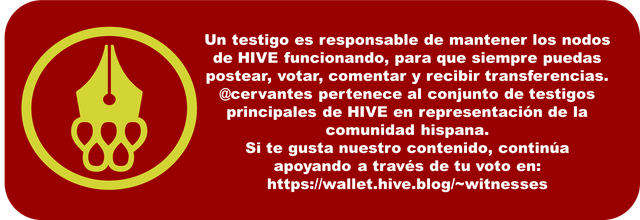Hablando de los "deberías."//Speaking of shoulds

El deber implica una obligación, un compromiso por cumplir, una responsabilidad adquirida. En el deber se encuentran nuestros valores éticos y morales.
La amiga @charjaim en su columna quincenal “Esta vida nuestra” nos propone el tema del deber con una perspectiva distinta, la que se da en la interacción donde interpelamos o somos interpelados con un: Tú debieras, tú deberías o tú debiste. Una interesante propuesta para revisar algunos aspectos en nuestras relaciones. Acá te dejo el enlace para que te unas a la iniciativa. A continuación comparto mis pareceres sobre el tema.
Uno de los aspectos que resaltan en estas tres construcciones lingüísticas es que funcionan perfectamente tanto si uno se las dice a alguien como si alguien nos las dice y en ellas hay todo contenido que juzga, cuando la escuchas, generalmente, se siente como imposición y no como sugerencia, es decir, tiene todo el peso del mandato, del deber.
No voy a decir que “nunca” las he pronunciado ni que “nunca” las he escuchado; sin embargo, desde muy joven le fui encontrando su sin sentido al “tú debiste”, quizás porque mi mamá en su genuina sabiduría cada vez que uno decía: —¡Ay, debí haber hecho…!
Respondía con un dicho, que solo a ella, se lo he escuchado:
—Si mi abuela tuviese ruedas fuese bicicleta— y más atrás la lección de que lo hecho, hecho está y no vale la pena detenerte en lo que debiste haber hecho y no lo hiciste, al tiempo que te increpaba con un: lo importante es lo que vas a hacer ahora.

Él tú debieras o tú deberías si han tenido mayor presencia en mi vida, es fácil encontrar personas que sin pensarlo mucho y sin que le pidamos su opinión sobre un asunto asumen el rol de consejero y desde el deber sueltan su parecer. La verdad es que en algunas oportunidades me ha molestado mucho, sobre todo, cuando son personas que tienen que ver muy poco con mi vida y cómo la resuelvo.
Pensando en ello me vine un lejano recuerdo del esposo de una prima que en una reunión familiar me abordó para decirme que no debería divorciarme y comenzó a argumentar, en un respiro lo atajé y le dije que solo uno conoce las goteras de su casa, que realmente su opinión no me interesaba. La verdad es que me molestó muchísimo, no entendí con qué derecho una persona se atribuye la potestad de opinar sobre algo tan personal e íntimo y quiera influir en las decisiones del otro.
Sin embargo, reconozco que en otras ocasiones he agradecido estas opiniones que, aunque no han sido pedidas, vienen de personas que desde el respeto y, aunque utilicen la odiosa frase “deberías”, su intención no es imponerse sino mostrar su visión y ofrecer otra mirada sobre la situación.
En este sentido, me parece que la utilización de estos términos y como los recibimos van a depender del grado de intimidad que tengamos con la persona, el tono y la gestualidad que los acompañan ayudan a crear un marco de aceptación o rechazo.
En lo que a mí concierne a medida que he ido avanzando en el crecimiento personal y las lecturas sobre el tema, me han abierto la oportunidad de quitarle peso al “deber” y entra en una idea más liviana: lo hago porque es una decisión mía, porque me gusta y encuentro en ello satisfacción, entonces procuro no actuar desde el deber, sino desde el querer.
Trasladar esa idea a la relación con los demás no siempre resulta fácil, ya que la tentación de opinar, aconsejar ante aquello que nos choca o nos molesta en las decisiones de los demás es grande, aún cuando no nos afecte directamente, pero es como ver a alguien correr hacia el barranco y quisieras detenerlo.
Comprender que el otro tiene que vivir sus experiencias y que las decisiones de vida hay que respetarlas es trabajar la aceptación y el control, lo cual no quiere decir que si alguien nos está planteando una situación no opinemos en absoluto. Con las herramientas del coaching he aprendido a soltar preguntas que lleven a la persona a reflexionar, teniendo presente que la idea fundamental es que el otro mida, tenga una visión más amplia, evalúe pros y contras, pero entendiendo que la decisión final solo le concierne a él o ella.
Pienso que si realmente queremos ayudar a alguien, eliminar esas tres frases de nuestro vocabulario sería un buen comienzo, ya que ellas están dentro del grupo de las que rompen la comunicación, crean barreras afectivas y que cuando son dadas desde la autoridad y la imposición (el padre, la madre) pueden abrir el camino hacia el resentimiento.

In English

Duty implies an obligation, a commitment to fulfill, an acquired responsibility. In duty lie our ethical and moral values.
Our friend @charjaim in her biweekly column "This life of ours" proposes the topic of duty with a different perspective, the one that occurs in the interaction where we interpellate or are interpellated with a: You should, you should or you should have. An interesting proposal to review some aspects of our relationships. Here I leave you the link for you to join the initiative. Below I share my thoughts on the subject.
One of the aspects that stand out in these three linguistic constructions is that they work perfectly whether you say them to someone or someone says them to you, and there is all the judging content in them, when you hear it, generally, it feels like an imposition and not a suggestion, that is, it has all the weight of a mandate, of a duty.
I am not going to say that I have "never" pronounced them nor that I have "never" heard them, however, since I was very young I found the meaninglessness of "you should have", perhaps because my mother, in her genuine wisdom, every time I said: -Oh, I should have done...!
She would respond with a saying that only she has ever heard:
-If my grandmother had wheels she would be a bicycle - and further back the lesson that what is done is done and it is not worth dwelling on what you should have done and did not do, while she would scold you with: what is important is what you are going to do now.

It is easy to find people who, without much thought and without being asked for their opinion on a matter, take on the role of advisor and from their duty they give their opinion. The truth is that on some occasions it has bothered me a lot, especially when they are people who have very little to do with my life and how I solve it.
Thinking about it, I had a distant memory of a cousin's husband who approached me in a family meeting to tell me that I should not get divorced and started to argue, in a breath I attacked him and told him that only one knows the leaks in his house, that I was not really interested in his opinion. The truth is that it bothered me a lot, I did not understand with what right a person attributes to himself the power to give an opinion on something so personal and intimate and wants to influence the decisions of the other.
However, I recognize that in other occasions I have appreciated these opinions that, although they have not been asked for, come from people that from respect and, although they use the hateful phrase "you should", their intention is not to impose themselves but to show their vision and offer another look at the situation.
In this sense, it seems to me that the use of these terms and how we receive them will depend on the degree of intimacy we have with the person, the tone and the gestures that accompany them help to create a framework of acceptance or rejection.
As far as I am concerned, as I have progressed in my personal growth and the readings on the subject have given me the opportunity to remove the weight of "duty" and enter into a lighter idea: I do it because it is my decision, because I like it and I find satisfaction in it, so I try not to act from duty but from desire.
Transferring this idea to the relationship with others is not always easy, since the temptation to give an opinion, to give advice about what shocks us or bothers us in the decisions of others is great, even when it does not affect us directly, but it is like seeing someone running into a ravine and you would like to stop him.
Understanding that the other has to live their experiences and that life decisions must be respected is to work on acceptance and control, which does not mean that if someone is presenting us with a situation we do not have an opinion at all. With the tools of coaching I have learned to ask questions that lead the person to reflect, keeping in mind that the fundamental idea is that the other person measures, has a broader vision, evaluates pros and cons, but understanding that the final decision only concerns him or her.
I think that if we really want to help someone, eliminating these three phrases from our vocabulary would be a good start, since they are in the group of those that break communication, create emotional barriers and when they are given from the authority and imposition (the father, the mother) can open the way to resentment.

Translated with www.DeepL.com/Translator (free version)
Fuente de imágenes: Archivo personal
Portada Fragmento pintura de @Charjaim, modificada en PowerPoint.



MIS REDES SOCIALES





Te invito a apoyar este proyecto como witnes y a formar parte de esta gran comunidad uniéndote a su Discord en el siguiente enlace:
Discord de la comunidad Cervantes


Be Entrepreneur




https://twitter.com/damaryspacheco5/status/1561416330703675398
https://twitter.com/zullycscott/status/1561698877706838017
The rewards earned on this comment will go directly to the people( @zullyscott ) sharing the post on Twitter as long as they are registered with @poshtoken. Sign up at https://hiveposh.com.
Felicidades por tan buen artículo, es usted muy buena escritora, siempre leo sus pots y aprendo de usted, un saludo ....🙋🙋🙋🙋
Hola amiga @damarysvibra ,ciertamente hay personas que no deberían inmiscuirse en los asuntos de los demás,muy buena su respuesta porque es su vida .Y si cuando proviene de personas que te respetan y podrían considerarse nodelos a seguir la cosa cambia sin embargo sigue siendo nuestra vida.Que buena esta iniciativa de la amiga,esta es nueva voy a revisarla,gracias.
Tres frases u oraciones que sin duda muchas veces me han colocado a sentir cosas no muy gratas, creo profundamente que el deber debe ir ligado al Amor, así se quita el título de deber, obviamente a nivel social, en cuanto a las leyes de un país no podemos obviar los deberías, pero a nivel personal en la vida tendríamos que hacer aquello que nos de paz y bienestar. Siempre me he considerado una persona bastante rebelde , y cuando me dice. "deberías" hacer tal o cuall cosa inmediatamente pregunto ¿Por qué, porque te hace feliz a ti o me hará feliz a mi? . Siempre habrá que decidir con equilibrio pero sobre todo siempre habría que tomar esas decisiones desde el amor, estoy segura que desde allí todos los deberían desaparecerían. Un abrazo.
Saludos amiga @damarysvibra 👋👋
Cómo bien lo mencionas, la influencia de estos términos en nuestra vida dependerá mucho del grado de conexión que tengamos con esa persona y también podamos entender la intención de las palabras.
Es algo con lo que debemos convivir día a día y por eso es muy importante tener un fundamento claro que nos permita tomar buenas decisiones 🙂
Gracias por compartir esta publicación amiga, mucho éxito para ti 👋👋🥳🥳
@tipu curate 4
Upvoted 👌 (Mana: 15/55) Liquid rewards.
Excelente reflexión, sabias palabras muy sabias. Es cierto lo que dices esas palabras son odiosas, traen en su esencia el control, y nadie quiere ser controlado. A nadie le gusta ser criticado ni juzgado, siempre hablo de la empatía. Más empatía y menos juicio, esa es la clave de las buenas relaciones interpersonales. Un post cargado de mucha sabiduría y amor. Gracias por tan hermosas e impecables palabras.😉😃😍 Saludos 😘🤗
Valiosos aportes al tema, amiga, realmente es tal como lo dices, quizá si evitamos ser tan incisivos con estas expresiones podemos tener mejores interrelaciones sobre todo como padres. Es agradable constatar como la actividad del coaching ayuda en ese camino. Saludos cordiales.